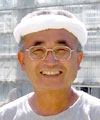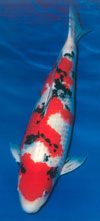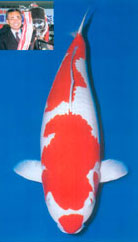
Featured Breeder
Senichi Mano(Izumiya Koi Farm)
Chairman of the board of Directors
All Japan Nishikigoi Promotion Associaition |
 |
Among many of Niigata’s Koi farms, Izumiya Koi Farm is one of the long-established traditional farms, and Mr. Mano is a person well liked by many breeders. He holds a stirring performance: he has won the overall championship in the 14th All Japan Combined Nishikigoi Show of 1982 and the Minister of Agruculture, Forestry and Fishereies prize in the 41st Niigata Nogyosai. Currently, he enthusiastically practices old-fashioned natural breeding methods to produce strong Koi.
|
I am the 3rd generation of Izumiya Koi Farm. Founder Ichiro Mano was a person who, even by ignoring profits, always put priority on making people happy. He was able to gather 20-30 bulls for Tsunotsuki just by calling out to the village people. He was a person of established credibility. In earlier times, he worked mainly in bakuro (hakuraku)*1 more than in the Koi business. When he opened a general store that dealt with cattle feed after succeeding in kachikusho*2, he named it Izumiya because springs existed in this area. Production of Koi was little back then. He used to sell Tategoi purchased from other breeders, and I’ve heard that he sometimes bartered Koi with antiques and pipes.
 When I was in 4th grade, we faced food storage. We didn’t even have our own food not to mention Koi feed. I began working in the Koi business right after I graduated from junior high school. At first, I didn’t have anything: donaga*3, vinyl, oxygen tanks, and cars. Everyday I walked up to the field ponds in the mountains and came down with a pail full of water and Koi just to raise them in better condition. It took me a lot of work. Compared to that, it is so convenient nowadays that it’s no exaggeration to say that I am too blessed. When I was in 4th grade, we faced food storage. We didn’t even have our own food not to mention Koi feed. I began working in the Koi business right after I graduated from junior high school. At first, I didn’t have anything: donaga*3, vinyl, oxygen tanks, and cars. Everyday I walked up to the field ponds in the mountains and came down with a pail full of water and Koi just to raise them in better condition. It took me a lot of work. Compared to that, it is so convenient nowadays that it’s no exaggeration to say that I am too blessed.
 Ojiya City and Yamakoshi are the origins of Nishikigoi but also are the home of Tsunotsuki bullfighting. It began in this area by fighting farming bulls and gradually penetrated into everybody’s lives. The number and necessity of farming bulls have decreased with the times, but Tsunotsuki is a valuable traditional culture that is still carried on. In early ages, Koi were raised only in ponds used to irrigate rice paddies, but with the decline of bulls, Koi have been upvalued to the main focus of people’s lives. Considering these points, we realized that Koi are an extension of farming and bull raising, hence they are all linked together. That’s why we feel proud of our Koi passed down from ancient times, just as we are of our bulls. So when I make sand for my ponds, I do it just the way farmers do. I use set cow pie and organic fertilizer. My Koi are never artificially spawned, and I use field ponds as much as possible rather than house ponds. What I noticed in cultivating Koi using conventional methods is that Koi become stronger when raised in a natural state and not overprotected. Ojiya City and Yamakoshi are the origins of Nishikigoi but also are the home of Tsunotsuki bullfighting. It began in this area by fighting farming bulls and gradually penetrated into everybody’s lives. The number and necessity of farming bulls have decreased with the times, but Tsunotsuki is a valuable traditional culture that is still carried on. In early ages, Koi were raised only in ponds used to irrigate rice paddies, but with the decline of bulls, Koi have been upvalued to the main focus of people’s lives. Considering these points, we realized that Koi are an extension of farming and bull raising, hence they are all linked together. That’s why we feel proud of our Koi passed down from ancient times, just as we are of our bulls. So when I make sand for my ponds, I do it just the way farmers do. I use set cow pie and organic fertilizer. My Koi are never artificially spawned, and I use field ponds as much as possible rather than house ponds. What I noticed in cultivating Koi using conventional methods is that Koi become stronger when raised in a natural state and not overprotected.
I focus on natural breeding methods not only because I am proud of this area’s tradition. My Koi aren’t the most eye-catching Koi at a show. They are rather plain, but that is because I focus on their obdurability so the Koi lovers can enjoy Nishikigoi for a long term. Beauty and size of course are main attractions of Koi, but I would like for Koi lovers to love and raise them for many years to come.
|
|



 When I was in 4th grade, we faced food storage. We didn’t even have our own food not to mention Koi feed. I began working in the Koi business right after I graduated from junior high school. At first, I didn’t have anything: donaga*3, vinyl, oxygen tanks, and cars. Everyday I walked up to the field ponds in the mountains and came down with a pail full of water and Koi just to raise them in better condition. It took me a lot of work. Compared to that, it is so convenient nowadays that it’s no exaggeration to say that I am too blessed.
When I was in 4th grade, we faced food storage. We didn’t even have our own food not to mention Koi feed. I began working in the Koi business right after I graduated from junior high school. At first, I didn’t have anything: donaga*3, vinyl, oxygen tanks, and cars. Everyday I walked up to the field ponds in the mountains and came down with a pail full of water and Koi just to raise them in better condition. It took me a lot of work. Compared to that, it is so convenient nowadays that it’s no exaggeration to say that I am too blessed.  Ojiya City and Yamakoshi are the origins of Nishikigoi but also are the home of Tsunotsuki bullfighting. It began in this area by fighting farming bulls and gradually penetrated into everybody’s lives. The number and necessity of farming bulls have decreased with the times, but Tsunotsuki is a valuable traditional culture that is still carried on. In early ages, Koi were raised only in ponds used to irrigate rice paddies, but with the decline of bulls, Koi have been upvalued to the main focus of people’s lives. Considering these points, we realized that Koi are an extension of farming and bull raising, hence they are all linked together. That’s why we feel proud of our Koi passed down from ancient times, just as we are of our bulls. So when I make sand for my ponds, I do it just the way farmers do. I use set cow pie and organic fertilizer. My Koi are never artificially spawned, and I use field ponds as much as possible rather than house ponds. What I noticed in cultivating Koi using conventional methods is that Koi become stronger when raised in a natural state and not overprotected.
Ojiya City and Yamakoshi are the origins of Nishikigoi but also are the home of Tsunotsuki bullfighting. It began in this area by fighting farming bulls and gradually penetrated into everybody’s lives. The number and necessity of farming bulls have decreased with the times, but Tsunotsuki is a valuable traditional culture that is still carried on. In early ages, Koi were raised only in ponds used to irrigate rice paddies, but with the decline of bulls, Koi have been upvalued to the main focus of people’s lives. Considering these points, we realized that Koi are an extension of farming and bull raising, hence they are all linked together. That’s why we feel proud of our Koi passed down from ancient times, just as we are of our bulls. So when I make sand for my ponds, I do it just the way farmers do. I use set cow pie and organic fertilizer. My Koi are never artificially spawned, and I use field ponds as much as possible rather than house ponds. What I noticed in cultivating Koi using conventional methods is that Koi become stronger when raised in a natural state and not overprotected.